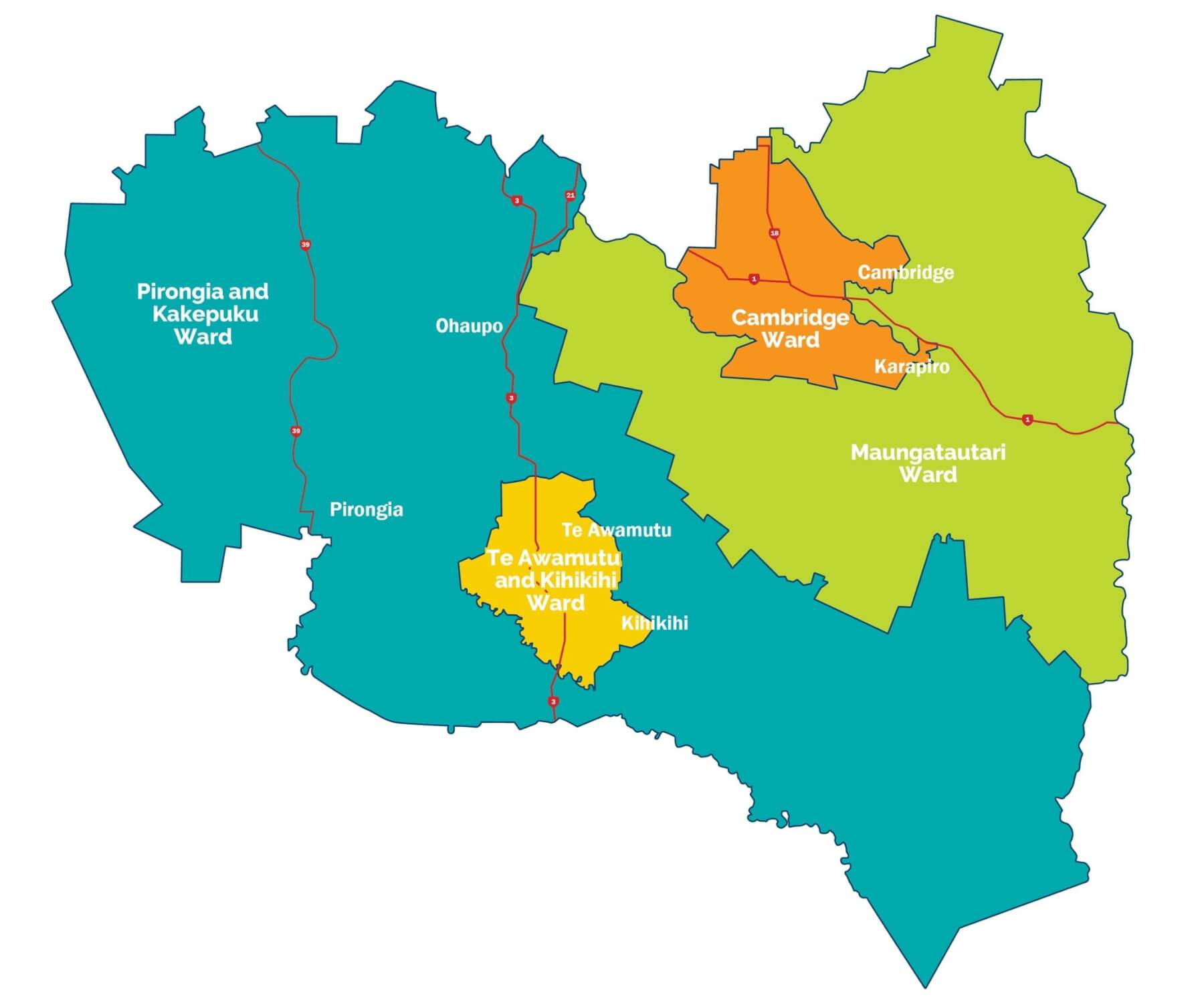Review decision made
Waipā District Council has decided not to proceed with its proposed representation review but have considered changes to the community board representation model.

Waipā District Council comprises a mayor (elected at large) and 11 councillors, elected from five wards:
Pirongia-Kakepuku General Ward (2 councillors)
Cambridge General Ward (4 councillors)
Maungatautari General Ward (1 councillor)
Te Awamutu-Kihikihi General Ward (3 councillors)
Waipā Māori Ward (1 councillor)
The council received 109 submissions on the review – with only 23 in favour – which would have reduced the number of councillors (plus the Maori ward) from 10 to seven and combine the rural wards of Pirongia-Kakepuku and Maungatautari.
Councillors rejected that today – with only mayor Susan O’Regan in favour – and decided at their Finance and Corporate committee to recommend to the Local Government Commission that the Māori ward representative – elected at large across the district – can be included on the two community boards in Cambridge and Te Awamutu-Kihikihi.
Council currently appoints two elected councillors – one from an urban area, the other rural – to the community boards.
Following a submission from the Cambridge Community Board, councillors have amended that to provide for Māori ward representation.
Last month Waipā councillors voted to support Māori wards but the decision means voters will be polled at next year’s local body elections on whether to continue with having an at large Waipā Māori ward in the district.
See: Maori ward to remain
See: Waipa supports Maori wards
See: Mapping out Waipa
White Christmas

Te Awamutu Christmas Parade 2022
Te Awamutu’s Rotary Christmas Parade will switch to a Saturday event this year – on December 7 – after being a Sunday parade for the last two years. The theme will be “It’s a White Christmas’ and there will be three categories for floats – commercial/business, service clubs and societies, and children and youth.
Neglect linked to economy
The SPCA has drawn links between animal neglect and the economy
In response to the prosecution of a Te Awamutu resident, SPCA chief executive Todd Westwood said people were under pressure, “they’re hurting and trying to make ends meet – sadly, animals get drawn into that and we see this outcome all too often”.
The owner of a dog named Sole who pleaded guilty to ill treatment of an animal was last week sentenced to 100 hours community work and disqualified from owning animals for three years.
The plight of Sole, a male black labrador retriever cross, was exposed by a member of the public in June 2023. He was emaciated, and had muscle wastage, from poor nutrition, and there was strong evidence of long-term self-trauma.
SPCA contacted the owner who gave consent for Sole to be put down. He said due to working two jobs he fed Sole once a day and noticed he was losing weight but didn’t know what to do about it. He said he had tried to wash Sole’s sores but didn’t seek help or advice.
“A neglected animal is deeply affected by their environment, pain, and distress. Sole is sadly another who was left to become so woefully unwell that experts determined death was his only reprieve from suffering.” Westwood said.
Fines rise
Illegal parking in Waipā disability spaces will incur a fine of $750 from next month – up from $150 after government changes to parking fines. The council has issued 42 infringement notices this year, 16 were later cancelled because the person had forgotten to display their permit.
Ammunition found
More live ammunition has been found in recycling at the Te Awamutu sorting centre. A shotgun cartridge was found the day after a helium tank was pulled out of another load of recycling on its way to the sorting line. Both items were collected from Cambridge properties.
Concession debate
A Waipā resident who bought a $200 year-long concession card for pools in Te Awamutu and Cambridge but was unable to use all of it because of an injury has started a petition asking Go Waipā to reconsider extending concession cards under those circumstances.
Fund open
Waipā’s District Promotion event fund – which aims to support events that drive economic activity and promote Waipā as a great place to live, work, invest in, or visit – is open for applications. The amount available has reduced from $150,000 to $75,000.
Cheese cutters to be surpassed
Centre road median barriers are expected to become obsolete as new vehicle technology becomes more readily used, councillors heard at the September regional road transport committee meeting.
Ōtorohanga District councillor Rodney Dow asked if new technology could replace the ‘cheese cutter’ median barriers.
“The new trucks we are buying have all got lane departure, if you go outside your lane they beep and turn the steering wheel back. Is there any thought that NZTA might make it that for every new vehicle that goes on the road has to have that sort of technology?
“Putting wire ropes down the middle of the road is going to take years, but even to put lane departure on cars will take years – but it might make it faster.
“Potentially if it was made mandatory now it might get done faster than putting wire ropes in the middle of every road.”
David Spiers from NZTA/Waka Kotahi said New Zealand’s problem was it has one of the world’s oldest vehicle fleets, cars and trucks.
“And the process to upgrade those would take a really, really, long time. We are actually doing some work on exactly that… technology will surpass the need for actual physical barriers.”
In some Australian states trucks were now required to have anti-collision braking, so if a truck gets too close to a vehicle in front, it braked automatically, Dow said.
The committee heard earlier that a central median barrier reduced deaths and serious injuries by 65 per cent.

Mike Pettit
Waipā District councillor Mike Pettit asked how the median barriers could be extended on Waikato highways.
Of about 11,000km of highway in the country, only about 680km has a centre median barrier.
“You really need to advocate as a regional transport committee that you want to see more of those barriers retrofitted. New state highways will have them as a matter of course,” Spiers said.
“There was a process for retrofitting centre line barriers but the regional transport committee would have to advocate pretty strongly. Fair to say that that programme has less priority than it had previously.”
Since 2014 across the region there has been 1661 crashes into barriers – 167 in Waipa 167, 81 in Waitomo in 18 Ōtorohanga 18.








